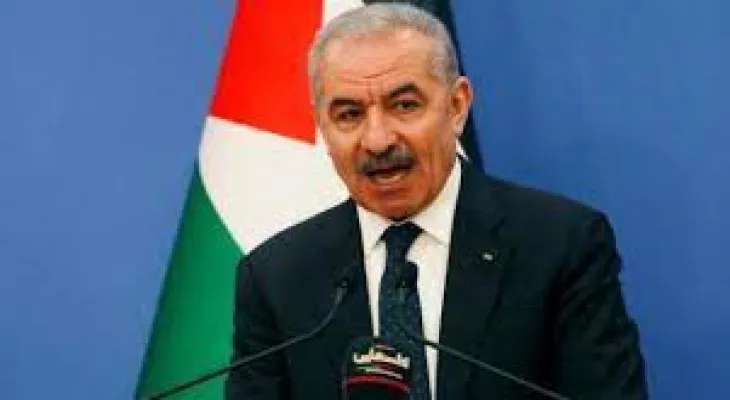Search here
Newspaper
Search here

Arab Canada News
News

Published: December 12, 2023
Palestinian Prime Minister Mohammad Shtayyeh said today, Tuesday, that the forced displacement plan is still on the table of the Israeli occupation, which is currently working to turn the Gaza Strip into an uninhabitable place, appreciating the role of the Arab Republic of Egypt in rejecting this plan.
Shtayyeh confirmed that work is ongoing with the brothers in Egypt at the Rafah crossing to facilitate the exit of the wounded for treatment, and there is a joint operations room with Egypt since the first day of the aggression, and there is a consular team from the Palestinian embassy in Cairo present at the Rafah crossing to facilitate any official procedures for the wounded and their companions.
Shtayyeh added - during his government's weekly meeting in the city of Ramallah - that the aggression on the Gaza Strip has entered its third month, and the images of aggression and mass killing are increasingly horrific, after more than 18,000 martyrs have fallen and the number of injured has exceeded 50,000, noting that the people of Gaza are displaced from their homes, and there is deliberate starvation everywhere in the Strip, especially in the north, and those who survive the bombing die of hunger, and those who survive hunger die wounded without treatment.
Shtayyeh said: "The occupation forced citizens from the north to the south by force of arms, and now the bombing is on the southern Gaza areas in Khan Yunis and Deir al-Balah, and they are all being pushed towards Rafah."
Shtayyeh continued: "We condemn everyone who encourages Israel to continue killing. We observe the policy of the United States, which is chaotic, internationally confused, and supportive of Israel. It says it is against killing civilians but prevents Security Council resolutions to stop the war. This support is unconditional for Israel, without Israel committing to the rules of international humanitarian law."
Shtayyeh pointed out that Israel is looking for security solutions, which is the approach it has adopted for 30 years and has never brought it peace. Sometimes it looks for security measures and solutions, sometimes it looks for economic peace, sometimes peace for peace, and sometimes money for calm. All these strategies have proven to fail, emphasizing that the solution lies in ending the occupation, realizing the rights of the Palestinian people, and recognizing Palestine.
He said that the occupation army and its settlers continue to commit crimes in the West Bank amid systematic sabotage operations of streets and infrastructure in camps and cities, stressing the need to put settlers on terrorism lists, prevent their entry into European countries, and the importance of preventing them from obtaining U.S. entry visas.
Shtayyeh called on the Prosecutor of the International Criminal Court to establish a database of the names of settlers, because their presence in the West Bank is illegal and also unlawful, for the purpose of prosecuting them.
Shtayyeh stressed the necessity of delivering all possible aid to the Gaza Strip, pointing out that the friendly country Cyprus has proposed establishing a "water corridor" to deliver aid to the Gaza Strip, but the concerning issue is that these vessels might be for deportation, and his government has informed friendly Cyprus of its rejection of this mechanism, despite acknowledging the sincerity of intentions.
Shtayyeh stressed that what is required from Israel is to open the existing crossings leading to the Gaza Strip, and not to confine them to the Rafah crossing only, and ships to transport food and medicine should be through the existing ports and not offshore.
In another context, Shtayyeh touched on the continued seizure of clearance funds by the occupation, saying: "Israel continues to hold our funds and makes unjustified and illegal deductions, whose only goal is political to isolate Gaza from the rest of the Palestinian territories."
Comments